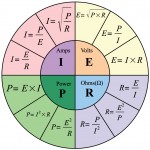 Some old-timers may be saying, “I been fixing appliances for 40 years and I never needed to know nothin’ about no Ohm’s Law. Sounds like more useless engineer stuff to me. I don’t need no stinkin’ Ohm’s Law!”
Some old-timers may be saying, “I been fixing appliances for 40 years and I never needed to know nothin’ about no Ohm’s Law. Sounds like more useless engineer stuff to me. I don’t need no stinkin’ Ohm’s Law!”
These are usually the same guys who can’t read schematics or use them to troubleshoot and are utterly lost on the new electronically-controlled appliances with multiple control boards. These guys are dinosaurs who will soon be extinct. Appliances circuits are only becoming more complicated, not less.
Gone are the days when you could just jumper out a handful of parts one by one until you found the bad part. You have to know how to troubleshoot electrical circuits and knowing Ohm’s Law is foundational to that. This applies to the new stuff as well as the old stuff. For example, without knowing how to use Ohm’s Law for circuit analysis, you’ll never figure out how this simple old-school electric dryer circuit works.
Understanding Ohm’s Law and circuits is one of the foundational skills for being a technician. In fact, if someone doesn’t know this stuff, they’re not really a technician— they’re just a parts changer. What’s the difference? Technicians understand how circuits and appliance systems work so they can use the schematic and specifications to do analytical troubleshooting and figure out the problem even on appliances they’ve never worked on before. Parts changers, on the other hand, rely on patterns they’ve previously encountered so their “troubleshooting” goes like this: “If this problem, replace that part.”
If you want to be a genuine appliance technician who can figure out how to fix anything, then start with the Core Appliance Repair Training course here at the Samurai Tech Academy.
Then take the Advanced Schematic Analysis and Troubleshooting training course to get advanced instruction on troubleshooting appliances with multiple electronic control boards.
This presentation on Ohm’s Law is one of the many enlightening technical presentations in the Basic Electricity module of the Core course.
https://youtube.com/watch?v=xYWzVknH6pQ